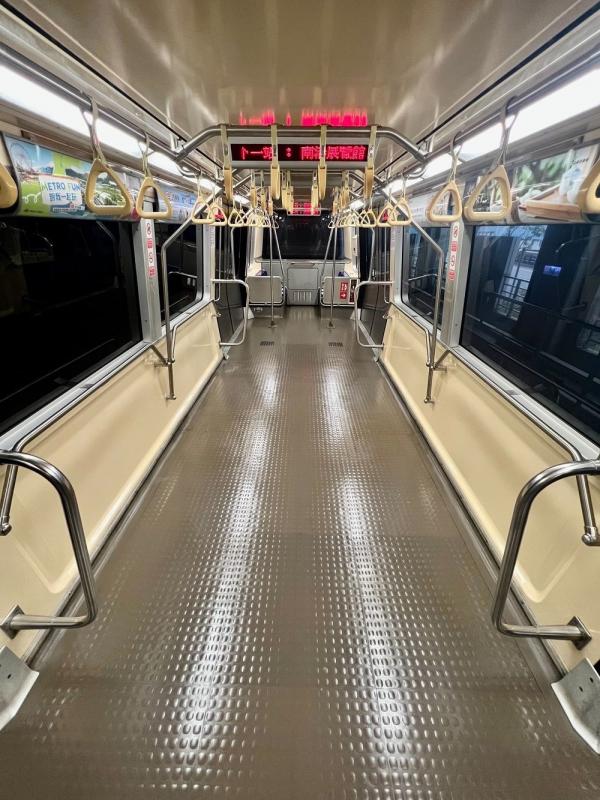Taipei Mayor Chiang Wan-an (蔣萬安) on Wednesday defended new subway cars for the Wenhu (Brown) Line that remove most seating in the hopes of increasing capacity on the perennially crowded line.
Taipei Rapid Transit Corp on Tuesday began trials of an updated interior design for the older VAL256 rolling stock, which removes the 12 seats from the center while keeping the eight priority seats at the ends.
During the trial, only two of the four carriages have been changed.

Photo courtesy of Taipei Rapid Transit Corp
The company estimates the change would raise capacity from 400 to 420 passengers per train.
It follows another alteration to the newer BT370 rolling stock in January that removed some seating and luggage racks.
The design attracted criticism from some city councilors, who after trialing the new carriages on Wednesday said the design was unfriendly.
Removing most of the seats is inconvenient to elderly people and those in need, Taipei City Councilor Ho Meng-hua (何孟樺) wrote on Facebook, adding that it was “treating the symptoms rather than the cause” of congestion.
The main reasons people cite for not wanting to ride the Brown Line aside from inconvenience is a lack of seating and crowding, she said, adding that the change would make people’s commute even less comfortable.
She also questioned whether the carriages were tested for the increased weight, as the Brown Line was not designed for such high capacity.
Ahead of a morning meeting with borough wardens, Chiang told reporters that the increased capacity would enable commuters to reach their destination faster during peak times.
The city government has been adopting every strategy to ease congestion, including building a new ring line to service the Neihu Science Park (內湖科技園區) — hopefully to begin construction within the next two years — and adding more trains during peak hours, he added.

Chinese spouse and influencer Guan Guan’s (關關) residency permit has been revoked for repeatedly posting pro-China videos that threaten national security, the National Immigration Agency confirmed today. Guan Guan has said many controversial statements in her videos posted to Douyin (抖音), including “the red flag will soon be painted all over Taiwan” and “Taiwan is an inseparable part of China,” and expressing hope for expedited reunification. The agency last year received multiple reports alleging that Guan Guan had advocated for armed reunification. After verifying the reports, the agency last month issued a notice requiring her to appear and explain her actions. Guan

GIVE AND TAKE: Blood demand continues to rise each year, while fewer young donors are available due to the nation’s falling birthrate, a doctor said Blood donors can redeem points earned from donations to obtain limited edition Formosan black bear travel mugs, the Kaohsiung Blood Center said yesterday, as it announced a goal of stocking 20,000 units of blood prior to the Lunar New Year. The last month of the lunar year is National Blood Donation Month, when local centers seek to stockpile blood for use during the Lunar New Year holiday. The blood demand in southern Taiwan — including Tainan and Kaohsiung, as well as Chiayi, Pingtung, Penghu and Taitung counties — is about 2,000 units per day, the center said. The donation campaign aims to boost

The Kaohsiung Tourism Bureau audited six hotels in an effort to prevent price gouging ahead of Korean band BTS’ concert tour in the city scheduled for Nov. 19, 21 and 22 this year. The bureau on Friday said that the audits — conducted in response to allegations of unfair pricing posted on social media — found no wrongdoing. These establishments included the local branches of Chateau de Chine, Hotel Nikko, My Humble House, and Grand Hai Lai, it said, adding that the Consumer Protection Commission would have penalized price gougers had the accusations been substantiated. The bureau said the Tourism Development Act

BACK TO WINTER: A strong continental cold air mass would move south on Tuesday next week, bringing colder temperatures to northern and central Taiwan A tropical depression east of the Philippines could soon be upgraded to be the first tropical storm of this year, the Central Weather Administration (CWA) said yesterday, adding that the next cold air mass is forecast to arrive on Monday next week. CWA forecaster Cheng Jie-ren (鄭傑仁) said the first tropical depression of this year is over waters east of the Philippines, about 1,867km southeast of Oluanpi (鵝鑾鼻), and could strengthen into Tropical Storm Nokaen by early today. The system is moving slowly from northwest to north, and is expected to remain east of the Philippines with little chance of affecting Taiwan,